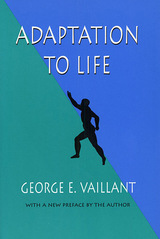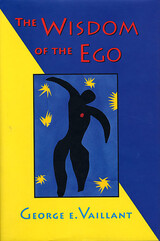
Between 1939 and 1942, one of America's leading universities recruited 268 of its healthiest and most promising undergraduates to participate in a revolutionary new study of the human life cycle. The originators of the program, which came to be known as the Grant Study, felt that medical research was too heavily weighted in the direction of disease, and their intent was to chart the ways in which a group of promising individuals coped with their lives over the course of many years.
Nearly forty years later, George E. Vaillant, director of the Study, took the measure of the Grant Study men. The result was the compelling, provocative classic, Adaptation to Life, which poses fundamental questions about the individual differences in confronting life's stresses. Why do some of us cope so well with the portion life offers us, while others, who have had similar advantages (or disadvantages), cope badly or not at all? Are there ways we can effectively alter those patterns of behavior that make us unhappy, unhealthy, and unwise?
George Vaillant discusses these and other questions in terms of a clearly defined scheme of "adaptive mechanisms" that are rated mature, neurotic, immature, or psychotic, and illustrates, with case histories, each method of coping.

A leading psychologist explains why nearly all of us—including many of those who are persecuted and powerless—so often defend the social systems that cause misery and injustice.
Why do we so often defend the very social systems that are responsible for injustice and exploitation? In A Theory of System Justification, John Jost argues that we are motivated to defend the status quo because doing so serves fundamental psychological needs for certainty, security, and social acceptance. We want to feel good not only about ourselves and the groups to which we belong, but also about the overarching social structure in which we live, even when it hurts others and ourselves.
Jost lays out the wide range of evidence for his groundbreaking theory and examines its implications for our communities and our democracy. Drawing on twenty-five years of research, he provides an accessible account of system justification theory and its insights. System justification helps to explain deep contradictions, including the feeling among some women that they don’t deserve the same salaries as men and the tendency of some poor people to vote for policies that increase economic inequality.
The theory illuminates the most pressing social and political issues of our time—why has it been so hard to combat anthropogenic climate change?—as well as some of the most intimate—why do some black children prefer white dolls to black ones and why do some people stay in bad relationships? Jost’s theory has far-reaching implications, and he offers numerous insights that political activists and social justice advocates can use to promote change.

READERS
Browse our collection.
PUBLISHERS
See BiblioVault's publisher services.
STUDENT SERVICES
Files for college accessibility offices.
UChicago Accessibility Resources
home | accessibility | search | about | contact us
BiblioVault ® 2001 - 2024
The University of Chicago Press









